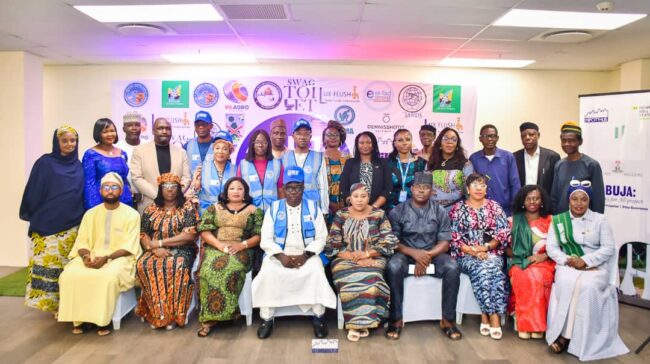In a bid to tackle Nigeria’s sanitation challenges, stakeholders at the Abuja Sanitation Conference decried the terrible state of open defecation in all the area councils of the Federal Capital Territory.
The conference took centre stage on November 21, 2024, marking World Toilet Day. Organised by HipCity Innovation Centre and the FCT-Rural Water Supply and Sanitation Directorate (FCT-RUWASSA), the event spotlighted the Federal Capital Territory’s (FCT) struggle with open defecation, which affects millions of Nigerians.
Bassey Bassey, Executive Director of HipCity Innovation Centre, emphasised the gravity of the situation. “It is really sad that the Federal Capital Territory, the capital of Nigeria, does not have even a single area council that is open defecation-free,” he said, noting the urgent need for stakeholders to localise the national strategy to end open defecation.
With over 40 million Nigerians lacking access to safe toilets, the conference aimed to raise awareness, promote youth engagement in sanitation enterprises, and drive innovation in tackling the crisis. Bassey highlighted the economic opportunities in addressing sanitation issues, citing recycling and biogas production as potential ventures.
“Every day, people eat, and as people eat, they will defecate. Why don’t we creatively manage human faeces to generate biogas and other recyclable materials?” Bassey proposed.
Luke Ifop Ulom, Overseeing Director of FCT-RUWASSA, praised the FCT administration’s commitment to sanitation, citing Executive Order 009 as a cornerstone for combating open defecation. “The Honourable Minister has empowered the directorate to provide sanitation facilities and tools to foster hygiene awareness in communities,” Ulom said.
However, Ulom acknowledged persisting challenges, particularly in informal settlements where open defecation remains rampant. He revealed plans to inaugurate a sanitation law enforcement committee to curb such practices.
The conference also spotlighted HipCity’s Swag Toilet initiative, aimed at empowering youth as sanitation ambassadors in their communities. Bassey explained, “This initiative introduces young people to sanitation jobs, enabling them to educate others about proper toilet use without relying on external funding.”
The Federal Ministry of Water Resources and Sanitation’s National Coordinator for the Clean Nigeria Campaign, Mrs. Chizoma Opara, shared insights on the federal government’s strategic plan to achieve an Open Defecation-Free (ODF) Nigeria by 2030. “We’re working towards eliminating ODF with strengthened coordination and multi-sectoral partnerships,” she said.
Despite progress, Opara stressed that significant work remains. “As of today, 135 local governments are open defecation-free. We need sustained efforts and grassroots collaboration to meet our 2030 target,” she added.
The lack of accessible sanitation facilities in underserved areas remains a critical barrier. Bassey called for public-private partnerships to bridge this gap. “Government alone cannot solve this problem. Enabling laws must be created to allow private sector involvement in providing sanitation infrastructure,” he urged.
The conference featured discussions on innovative solutions like circular economies, where waste is recycled back into the system. “In countries like India and China, greywater is reused effectively. We can adopt similar practices,” Bassey said.
Stakeholders also debated enforcement measures, including arrests for open defecation. Bassey proposed environmental cooperatives employing youth to monitor and discourage such practices, alongside subsidised toilet access for underserved communities.
While the FCT government has provided some facilities, Ulom admitted the need for better utilization. “Our next step is implementing sanitation laws to ensure proper use of these facilities,” he stated.
The conference concluded with a renewed commitment to addressing the sanitation crisis. Stakeholders vowed to work collaboratively to ensure that the FCT and Nigeria as a whole achieve ODF status by 2030, signalling a turning point in the nation’s sanitation efforts.
READ MORE FROM: NIGERIAN TRIBUNE
WATCH TOP VIDEOS FROM NIGERIAN TRIBUNE TV
- Let’s Talk About SELF-AWARENESS
- Is Your Confidence Mistaken for Pride? Let’s talk about it
- Is Etiquette About Perfection…Or Just Not Being Rude?
- Top Psychologist Reveal 3 Signs You’re Struggling With Imposter Syndrome
- Do You Pick Up Work-Related Calls at Midnight or Never? Let’s Talk About Boundaries







